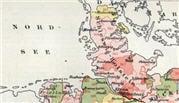Source Information

About Bischofswerda, Germany, Marriages, 1876-1940
About the Bischofswerda, Germany, Marriages, 1876-1940
General collection information
This collection contains images of civil marriage records created in Bischofswerda, Germany, between 1876 and 1940. Eleven other communities from the district of Bautzen are included in this collection. The date ranges of records from these communities may vary. Marriage records were created using preprinted forms that were filled in by hand by the registrar. Each document has a front and back that are displayed one after the other. There may also be notations on the record itself that have not been indexed. These notes, sometimes referred to as "narration," can contain additional information. All the records are written in German.
Using this collection
Records in this collection may include the following information:
The records in this collection can be used to verify that your ancestor was married in Bischofswerda, Germany, or surrounding communities on a specific date. Names of parents can help you expand your family tree. Marriage records with maiden names are helpful for researching the maternal branches of your family.
Here are some German words that may be helpful in reading the marriage registers:
Under "Browse this collection," select the "Civil Registration Office" and then the "Year Range" for the register desired. If a name directory was created, it will be found at the end of each individual volume.
Collection in context
The marriage registers were created by civic officials working in registration offices in Bischofswerda and surrounding communities. The registers are primary historical sources, and the original documents are housed at the Bischofswerda city archives.
Civil registration of marriages in Germany began in 1792 in the German states that had come under the control of France during the French Revolution. Between 1803 and 1874, civil registration of marriages was mandated in Hessen-Nassau, Westfalen, Hannover, and Prussia. Along with the rest of Germany, Bischofswerda began civil registration of marriages in January 1876.
Until 2009, German marriage records were only able to be viewed by those named in the records or their direct descendants. A civil records reform law went into effect in 2009 that allowed the public access to marriage records 80 years after they were created.
Bibliography
Beidler, James M. "Finding Digitized German Civil Records Online." Family Tree Magazine. Accessed September 4, 2023. https://familytreemagazine.com/heritage/german/online-german-civil-records/.
Powell, Kimberly. "Records of Births, Marriages and Deaths in Germany." ThoughtCo. Last modified March 3, 2019. https://www.thoughtco.com/germany-vital-records-1422812.
 Need help with the German language?
Need help with the German language?